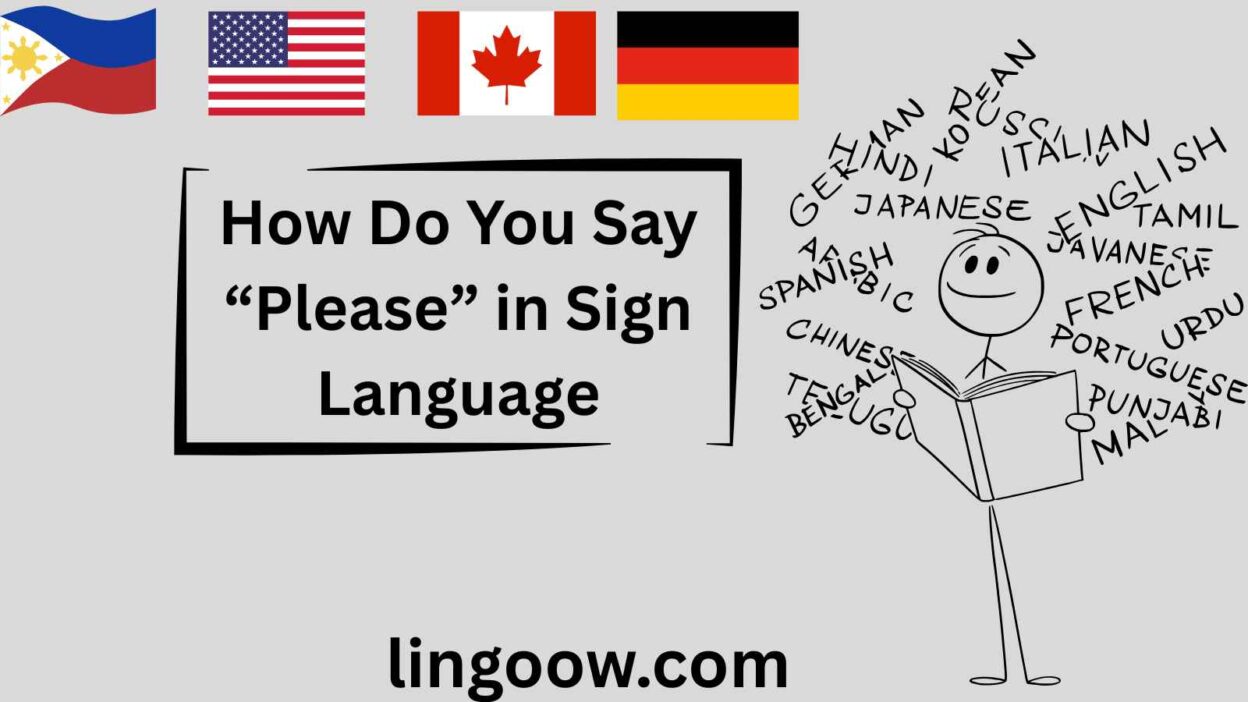It’s one of the first words we’re taught as children — a small word with immense power. Whether you’re asking for a favor, ordering food, or simply showing respect, “please” transforms a request into an act of grace. But imagine expressing this not with your voice, but with your hands.
I remember once watching a young girl in a café using sign language with her mother. When she wanted more juice, she didn’t speak. She placed her flat hand on her chest and moved it in a circular motion — the sign for “please.” It was silent, yet deeply polite, gentle, and filled with warmth.
Across languages and cultures, “please” connects us. It’s a universal key that opens hearts, shows humility, and builds bridges — whether spoken, written, or signed. Let’s explore how this powerful word is expressed — from sign language to spoken tongues around the world — and what it reveals about the beauty of human connection.
The Meaning of “Please” in Sign Language
In American Sign Language (ASL), “please” is signed by placing your flat hand on your chest and moving it in a circular motion, clockwise. It’s soft and graceful, mirroring the politeness of the spoken word.
In British Sign Language (BSL) and Auslan (Australian Sign Language), the sign may vary slightly, but the sentiment remains the same — a gesture of respect, kindness, and humility.
Sign language is not universal — each region has its own version. Yet, the emotion behind the sign remains identical: a quiet way to say “I respect you.”
🌐 Table: How to Say “Please” Around the World
| Language | Word/Phrase | Cultural Insight |
|---|---|---|
| English | Please | Derived from “if it pleases you” — a gesture of respect. |
| French | S’il vous plaît | Literally “if it pleases you,” used with formal politeness. |
| Spanish | Por favor | Expresses gratitude and courtesy in everyday speech. |
| Italian | Per favore | Often accompanied by warm tone and gestures. |
| German | Bitte | Means both “please” and “you’re welcome.” Context defines tone. |
| Mandarin Chinese | 请 (Qǐng) | Shows high respect; used in both formal and everyday speech. |
| Japanese | お願いします (Onegaishimasu) | Deeply rooted in humility and social harmony. |
| Korean | 제발 (Jebal) | Can sound emotional — often used to plead or beg politely. |
| Arabic | من فضلك (Min fadlik/fadlak) | Literally “from your grace.” Deeply tied to respect. |
| Swahili | Tafadhali | A word of both courtesy and community respect. |
| Zulu | Ngiyacela | Means “I am asking” — shows humility and reverence. |
| Yoruba | Ẹ jọ̀ọ́ | Reflects warmth and soft-spoken respect. |
| Hawaiian | E ʻoluʻolu | Means “be kind” — a gentle, friendly expression. |
| Maori | Tēnā koa | Used formally; conveys honor and cultural respect. |
| Cherokee | Wado (contextual) | Implies gratitude and politeness depending on tone. |
🇪🇺 European Languages: Grace in Politeness
In Europe, saying “please” is both a linguistic art and a cultural ritual.
- In French, “s’il vous plaît” feels elegant, a phrase that embodies France’s tradition of refinement and respect.
- Spaniards use “por favor” naturally, often with a warm smile — politeness wrapped in friendliness.
- In Germany, “bitte” carries multiple meanings, reflecting both humility and gratitude — the same word can mean “please,” “you’re welcome,” or “go ahead.”
Across Europe, “please” reflects centuries of etiquette — a way of softening language and nurturing social harmony.
🌏 Asian Languages: Politeness as a Cultural Foundation
In Asia, politeness is woven deeply into daily life — and the word “please” often carries spiritual or philosophical depth.
- In Japan, “onegaishimasu” is more than a word — it’s a ritual of respect. Used when making requests, it expresses humility and trust.
- In China, “请 (qǐng)” conveys deference, often used when inviting someone or asking for assistance.
- In India, many languages express “please” differently — in Hindi, “कृपया (kripya)” is formal and rooted in Sanskrit, meaning “out of compassion.”
- In Korea, “제발 (jebal)” can sound heartfelt or urgent — a cultural reflection of emotional sincerity.
- Arabic-speaking cultures use “min fadlik” (to a woman) or “min fadlak” (to a man), literally “from your grace.” It reflects a deep respect embedded in Arabic etiquette.
Here, “please” is not just politeness — it’s a reflection of honor, hierarchy, and humility.
🌍 African Languages: Respect Through Words
Africa’s linguistic diversity mirrors its cultural richness. Across more than 2,000 languages, words for “please” carry warmth, respect, and community values.
- In Swahili, “tafadhali” is common — a soft yet firm request.
- Zulu’s “ngiyacela” translates as “I am asking,” emphasizing humility.
- Yoruba’s “ẹ jọ̀ọ́” expresses both request and apology in one — a beautifully layered phrase.
- In Amharic (Ethiopia), “ebakih” (to a woman) or “ebakeh” (to a man) shows refined courtesy.
Across African societies, politeness is not just social — it’s communal. Saying “please” reinforces belonging, harmony, and empathy.
🏝 Indigenous & Island Languages: Politeness in Community Spirit
In island and indigenous cultures, politeness is deeply tied to respect for nature, elders, and spiritual connection.
- In Hawaiian, “e ʻoluʻolu” literally means “be kind.” It’s both a word and a philosophy of aloha.
- Maori (New Zealand) use “tēnā koa” in formal or traditional contexts, a way to show reverence.
- Cherokee’s “wado” often means “thank you,” but depending on tone and gesture, it carries nuances of gratitude and politeness.
- Samoan’s “fa’amolemole” is used in nearly every polite exchange — echoing the island’s deep sense of respect and community.
In these cultures, language isn’t separate from life — every “please” is a reflection of shared humanity.
🕊 Cultural Insights: The Evolution of “Please”
The English word “please” traces back to the phrase “if it pleases you,” emerging in the 14th century as a mark of civility. Across civilizations, similar phrases evolved from ideas of pleasure, favor, grace, and mercy.
Historically, politeness was more than manners — it was survival. Whether in royal courts or village gatherings, saying “please” ensured peace, respect, and mutual understanding. Today, even in our fast-paced digital world, the simple act of saying or signing “please” still carries profound human warmth.
🌺 Proverbs & Sayings About Politeness
- Japanese Proverb: “One kind word can warm three winter months.”
- African Proverb: “A gentle word opens an iron gate.”
- English Saying: “Manners cost nothing but mean everything.”
- Arabic Proverb: “A kind word is charity.”
- Chinese Saying: “Courtesy costs nothing but buys everything.”
These proverbs remind us that politeness — whether spoken or signed — transcends words. It’s an attitude of heart.
🙋♀️ FAQs
Q1: Is sign language universal?
No, each region has its own form — such as ASL (American), BSL (British), and Auslan (Australian).
Q2: Why do many words for “please” sound similar across languages?
Many derive from Latin or similar roots related to pleasure or favor.
Q3: What’s the oldest known form of “please”?
The phrase “if it pleases you” in medieval English is one of the earliest forms.
Q4: Why do some cultures use “please” less often?
In some languages (like Russian or Finnish), politeness is implied through tone or context rather than direct words.
💖 Conclusion: A Gesture That Unites Us All
Whether spoken, written, or signed — “please” is a universal gesture of kindness. It bridges silence and sound, culture and distance, formality and affection.
Next time you sign or say “please,” remember that you’re participating in something timeless — a human tradition of respect and empathy that connects every corner of the world.
✨ How do you say “please” in your language — or your sign language? Share it in the comments and let kindness travel even further.




